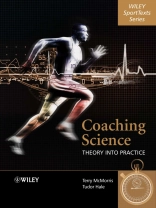Coaching Science and Coaching Studies courses are appearing in
increasing numbers in many universities. The textbooks used in most
of these courses are either theoretically based sports science
texts or practically based coaching books. The former are generally
lacking in application while the latter rarely have any scientific
input. The reader is, therefore, left to make the links themselves.
Coaching Science will bridge that gap covering both theory and
practice and, most important, showing how theory informs practice.
The book will be multi- and, to some extent, inter-disciplinary, as
it is not possible to examine the interaction between coach,
performer and task from a single discipline perspective.
Each chapter will include overviews of the main theories, but
the bulk of the material will be concerned with how such theories
can be applied in practice. Good and frequent use of examples will
be provided. Throughout, the student will be given problems to
solve. At the end of each chapter there will be revision notes,
recommended readings and questions on chapter content.
สารบัญ
Series Preface.
Preface.
I SOCIO-PSYCHOLOGICAL FACTORS.
1 Motivation.
2 Leadership and Cohesion.
3 Anxiety, Arousal and Performance.
4 Coaching and Learning Styles.
II SKILL ACQUISITION.
5 Learning.
6 Practice.
7 Observation and Feedback.
III PHYSIOLOGICAL FACTORS.
8 Physiological Demands of Track Athletics.
9 Factors that Limit Performance.
10 Principles of Physical Training.
IV DEVELOPMENTAL FACTORS.
11 Cognitive and Social Development.
12 Physiological and Motor Development.
V INTEGRATED FACTORS.
13 Developing Annual Programmes.
14 Integrated Warm-Up.
15 Integrating Practice and Training.
References.
Index.
เกี่ยวกับผู้แต่ง
Professor Terry Mc Morris, University College, Chichester, UK
Professor Tudor Hale, University College Chichester, UK












